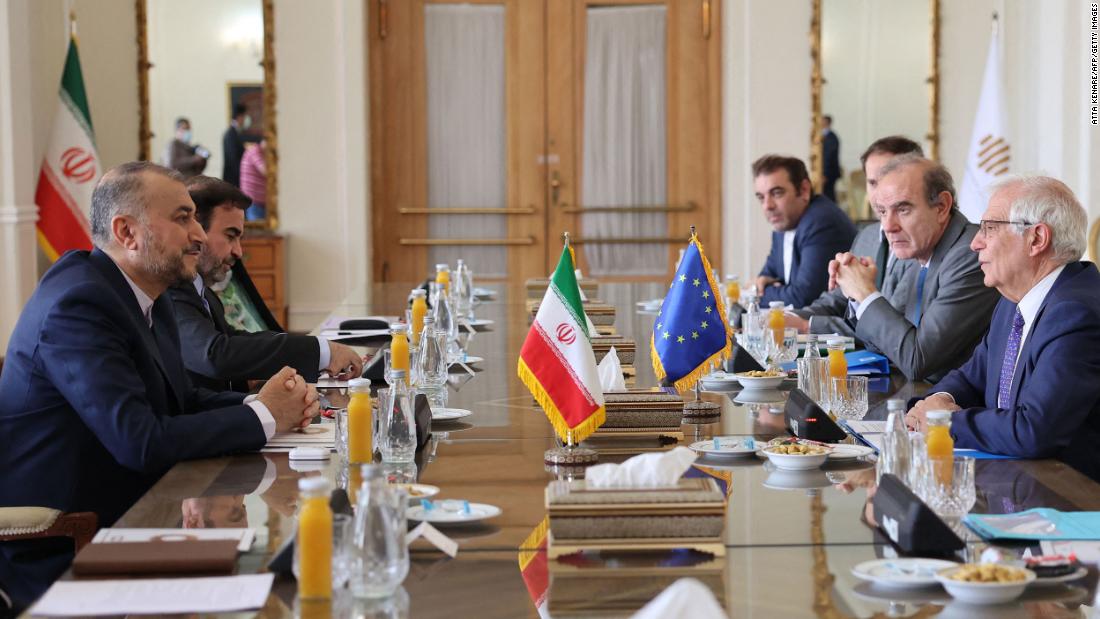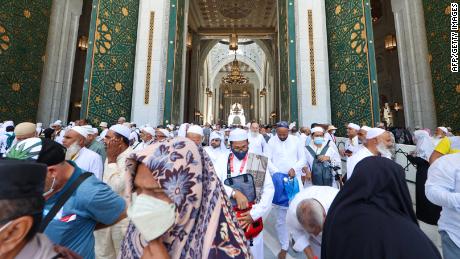The talks — mediated by the European Union and hosted in Doha, Qatar — were the latest hope at getting both sides to come to an agreement as tensions around Iran’s nuclear program grow.
Since the talks ended without any progress, how likely is escalation going forward and what would that look like?
Does the lack of progress in Doha mean the deal is dead?
What happens next?
The Iranians are likely to decide to postpone the deal until the next US [presidential election in 2024], with their leverage intact. But the Iranians have their own presidential election in 2025 and would have to wait for that electoral outcome. By that point, the deal would be dead and the parties would have to negotiate a new one from scratch, which is likely to take a few years.
What has the state of talks been since March and what led the two sides to meet in Doha?
In the past few weeks, the European Union’s chief negotiator, Enrique Mora, has been taking messages back and forth between Tehran and Washington to find a mutually acceptable formula. But long-distance diplomacy has proved slow and ineffective.
With growing concerns about Iran’s nuclear program in the West and in Israel, and Iran’s worsening economic situation under sanctions, both sides had an incentive to return to the negotiating table. The EU concluded that it would be much more efficient to facilitate the proximity talks with both sides in the same city rather than on two different continents.
Is the fact that the latest round of talks took place in a Persian Gulf country important?
It is significant for two reasons: first, it demonstrates how the regional context has changed compared to when the nuclear deal was finalized in 2015. Then, other than Oman, no other Gulf country was too keen on the deal, which they mostly saw as enriching and empowering a regional rival. Now, having lived through the Trump administration’s “maximum pressure” policy towards Iran that put them in the line of fire between Iran and the US, most Gulf countries understand the de-escalatory value of a deal.
What geopolitical factors have changed since March, when the US and Iran last held indirect talks?
This interview has been edited for length and clarity.
The digest
US says Israeli military gunfire likely responsible for Shireen Abu Akleh’s death but examination of bullet inconclusive
- Background: The Palestinians handed the bullet over to US authorities on Saturday, nearly two months after the Palestinian-American journalist was killed in Jenin in the West Bank. The Palestinians have refused to carry out a joint investigation with Israel, saying they do not trust the Israelis, but finally made the bullet available to US authorities over the weekend.
- Why it matters: Israel and the Palestinians had been an impasse over the investigation since she died from a single shot to the head on May 11. Investigations by at least five media outlets including CNN suggest the shot was fired from a position where IDF troops were located. None of the investigations found any evidence of Palestinian militants near Abu Akleh when she was shot, or of militants who had a direct line of fire towards her. A United Nations Human Rights Office investigation came to the same conclusion as the journalistic investigations.
Lebanon’s Hezbollah says drones sent toward Israeli gas rig in disputed waters
Hezbollah has claimed responsibility for launching three unarmed drones on Saturday towards an oil field in an area of the Mediterranean Sea that is disputed between Lebanon and Israel , the group said in a statement to CNN. Israel’s military said Saturday that the drones were shot down, and that they were launched from Lebanon and flew in the direction of the Karish gas field.
- Background: Hezbollah said that the drones were on “reconnaissance missions,” and that “the message was delivered.” The IDF described the drones as hostile but said that “an initial inquiry suggests that they did not pose an imminent threat.” An F-16 fighter jet and a missile ship intercepted the drones, the IDF added.
- Why it matters: Lebanon and Israel are in the midst of indirect negotiations about where a maritime economic border lies between the countries in the oil-rich part of the Mediterranean. In recent days Hezbollah has warned it could attack an Israeli ship that has moved towards the disputed area amid negotiations if Israel did not withdraw the vessel.
Ukrainian official says Ukraine appealed to Turkey to ‘detain’ Russian-flagged ship carrying its grain
Ukraine has requested that Turkish authorities detain a Russian-flagged ship carrying Ukrainian grain, the nation’s ambassador to Turkey, Vasyl Bodnar, told CNN on Saturday.
- Background: The Zhibek Zholy ship is currently at anchor near the Turkish port of Karasu as “it was in fact detained by Turkish customs authorities and it is not allowed to enter the port,” Bondar said. “Now we are waiting for the decision of the relevant authorities of Turkey regarding the actions that the law enforcement agencies of Ukraine insist on,” he said. The Turkish Trade Ministry didn’t respond to CNN’s request for confirmation that the ship has been detained. According to the ship tracking website Marine Traffic, the cargo ship left the Russian port Novorossiysk on June 22 and spent nearly a week at sea between Ukraine and Russia.
- Why it matters: Ukraine has repeatedly said Russia has stolen hundreds of thousands of tons of grain since the start of the war. The United Nations has said Russia’s blockade of Ukrainian ports has already raised global food prices and threatens to cause a catastrophic food shortage in parts of the world. Russia has repeatedly denied it is blocking the ports and Kremlin spokesman Dmitry Peskov has called allegations Russia was stealing grain from its neighbor “fake news.”
What to watch
Watch the full report here.
79%
Turkey’s annual inflation jumped to a 24-year high of 78.62% in June driven by the impact of the Ukraine war, soaring commodity prices and a slide in the lira since a December crisis.
Around the region
The nation of 10 million is now trying to change that. This weekend, the business and entertainment hub Dubai tightened rules around the use of plastic bags by introducing a 25 fils ($0.07) tariff on all single-use bags.
Dubai’s move comes just one month after Abu Dhabi, the nation’s capital, introduced a ban on all single-use plastic bags — the first to do so in the Middle East. Unlike Dubai, Abu Dhabi has not incentivized the public through a tariff but rather a complete ban.
The emirate has given retailers a four-month grace period to comply with the rules.
“It’s good, Europe and America are doing the same thing,” Fayiz, an employee at a supermarket in Dubai, told CNN.
Dubai’s tariff applies to all single-use bags with a thickness of 57 micrometers or below.
By Ghazi Nasser







More News
Opinion | The Truth Hurts — Especially When Bill Maher Dishes It Out
Opinion | Why the Manhattan Trial Is Probably Helping Trump
Opinion | Invading Rafah Doesn’t Help Israel